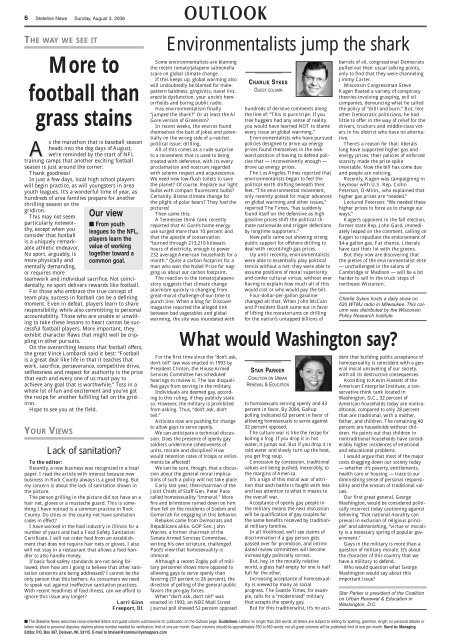Home sweet (first) home - Community Shoppers, Inc.
Home sweet (first) home - Community Shoppers, Inc.
Home sweet (first) home - Community Shoppers, Inc.
You also want an ePaper? Increase the reach of your titles
YUMPU automatically turns print PDFs into web optimized ePapers that Google loves.
6 Stateline News Sunday, August 3, 2008<br />
THE WAY WE SEE IT<br />
More to<br />
football than<br />
grass stains<br />
A<br />
s the marathon that is baseball season<br />
heads into the dog days of August,<br />
we’re reminded by the start of NFL<br />
training camps that another exciting football<br />
season is just around the corner.<br />
Thank goodness!<br />
In just a few days, local high school players<br />
will begin practice, as will youngsters in area<br />
youth leagues. It’s a wonderful time of year, as<br />
hundreds of area families prepare for another<br />
thrilling season on the<br />
gridiron.<br />
This may not seem<br />
particularly noteworthy,<br />
except when you<br />
consider that football<br />
is a uniquely remarkable<br />
athletic endeavor.<br />
No sport, arguably, is<br />
more physically and<br />
mentally demanding,<br />
or requires more<br />
YOUR VIEWS<br />
Our view<br />
■ From youth<br />
leagues to the NFL,<br />
players learn the<br />
value of working<br />
together toward a<br />
common goal.<br />
teamwork and individual sacrifice. Not coincidentally,<br />
no sport delivers rewards like football.<br />
For those who embrace the true concept of<br />
team play, success in football can be a defining<br />
moment. Even in defeat, players learn to share<br />
responsibility, while also committing to personal<br />
accountability. Those who are unable or unwilling<br />
to take these lessons to heart cannot be successful<br />
football players. More important, they<br />
exhibit character flaws that might well be crippling<br />
in other pursuits.<br />
On the overarching lessons that football offers,<br />
the great Vince Lombardi said it best: “Football<br />
is a great deal like life in that it teaches that<br />
work, sacrifice, perseverance, competitive drive,<br />
selflessness and respect for authority is the price<br />
that each and every one of us must pay to<br />
achieve any goal that is worthwhile.” Toss in a<br />
whole lot of fun and excitement and you’ve got<br />
the recipe for another fulfilling fall on the gridiron.<br />
Hope to see you at the field.<br />
Lack of sanitation?<br />
To the editor:<br />
Recently, a new business was recognized in a local<br />
paper. I read the article with interest because new<br />
business in Rock County always is a good thing. But<br />
my concern is about the lack of sanitation shown in<br />
the picture.<br />
The person grilling in the picture did not have on a<br />
hair net, gloves or a mustache guard. This is something<br />
I have noticed is a common practice in Rock<br />
County. Do cities or the county not have sanitation<br />
codes in effect?<br />
I have worked in the food industry in Illinois for a<br />
number of years and had a Food Safety Sanitation<br />
Certificate. I will not order food from an establishment<br />
that does not require hair nets or gloves. I also<br />
will not stay in a restaurant that allows a food handler<br />
to also handle money.<br />
If basic food-safety standards are not being followed,<br />
then how am I going to believe that other sanitation<br />
concerns are being addressed? I cannot be the<br />
only person that this bothers. As consumers we need<br />
to speak out against ineffective sanitation practices.<br />
With recent headlines of food illness, can we afford to<br />
ignore this issue any longer?<br />
Lorri Ginn<br />
Freeport, Ill.<br />
OUTLOOK<br />
Environmentalists jump the shark<br />
Some environmentalists are blaming<br />
the recent tomato/jalapeno salmonella<br />
scare on global climate change.<br />
If this keeps up, global warming also<br />
will undoubtedly be blamed for malepattern<br />
baldness, gingivitis, navel lint,<br />
erectile dysfunction, your uncle’s hemorrhoids<br />
and boring public radio.<br />
Has environmentalism finally<br />
“jumped the shark?” Or at least the Al<br />
Gore version of Greenism?<br />
In recent weeks, the enviros found<br />
themselves the butt of jokes and potentially<br />
on the wrong side of a red-hot<br />
political issue: drilling.<br />
All of this comes as a rude surprise<br />
to a movement that is used to being<br />
treated with deference, with its every<br />
proclamation and nostrum regarded<br />
with solemn respect and acquiescence.<br />
We need new low-flush toilets to save<br />
the planet? Of course. Replace our light<br />
bulbs with compact fluorescent bulbs?<br />
Certainly. Blame climate change for<br />
the plight of polar bears? They had the<br />
pictures!<br />
Then came this:<br />
A Tennessee think tank recently<br />
reported that Al Gore’s <strong>home</strong> energy<br />
use surged more than 10 percent and<br />
that the apostle of conservation<br />
“burned through 213,210 kilowatthours<br />
of electricity, enough to power<br />
232 average American households for a<br />
month.” Quite a carbon footprint for a<br />
man who won the Nobel Prize for nagging<br />
us about our carbon footprint.<br />
The reaction to the tomato/jalapeno<br />
story suggests that climate change<br />
alarmism quickly is changing from<br />
great-moral-challenge-of-our-time to<br />
punch line. When a blog for Discover<br />
magazine reported the alleged link<br />
between bad vegetables and global<br />
warming, the site was inundated with<br />
hundreds of derisive comments along<br />
the line of: “This is pure tripe. If you<br />
tree huggers had any sense of reality<br />
you would have learned NOT to blame<br />
every issue on global warming.”<br />
Environmentalists who have pursued<br />
policies designed to drive up energy<br />
prices found themselves in the awkward<br />
position of having to defend policies<br />
that — inconveniently enough —<br />
drove up energy prices.<br />
The Los Angeles Times reported that<br />
environmentalists began to feel the<br />
political earth shifting beneath their<br />
feet. “The environmental movement,<br />
only recently poised for major advances<br />
on global warming and other issues,”<br />
reported The Times, “has suddenly<br />
found itself on the defensive as high<br />
gasoline prices shift the political climate<br />
nationwide and trigger defections<br />
by longtime supporters.”<br />
New polls came out showing strong<br />
public support for offshore drilling to<br />
deal with record-high gas prices.<br />
Up until recently, environmentalists<br />
were able to essentially play political<br />
tennis without a net: they were able to<br />
assume positions of moral superiority<br />
and confer cultural virtue, without ever<br />
having to explain how much all of this<br />
would cost or who would pay the bill.<br />
Four-dollar-per-gallon gasoline<br />
changed all that. When John McCain<br />
and President Bush came out in favor<br />
of lifting the moratoriums on drilling<br />
for the nation’s untapped billions of<br />
barrels of oil, congressional Democrats<br />
pulled out their usual talking points,<br />
only to find that they were channeling<br />
Jimmy Carter.<br />
Wisconsin Congressman Steve<br />
Kagen floated a variety of conspiracy<br />
theories involving grasping, evil oil<br />
companies, denouncing what he called<br />
the policy of “drill and burn.” But, like<br />
other Democratic politicians, he had<br />
little to offer in the way of relief for the<br />
drivers, truckers and middle-class voters<br />
in his district who have no alternative.<br />
There’s a reason for that: liberals<br />
long have supported higher gas and<br />
energy prices; their policies of enforced<br />
scarcity made the price spike<br />
inevitable. Now the bill has come due<br />
and people are noticing.<br />
Recently, Kagen was campaigning in<br />
Seymour with U.S. Rep. Collin<br />
Peterson, D-Minn., who explained that<br />
higher gas prices are “needed.”<br />
Lectured Peterson: “We needed these<br />
higher prices to force us to change our<br />
ways.”<br />
Kagen’s opponent in the fall election,<br />
former state Rep. John Gard, immediately<br />
leaped on the comment, calling on<br />
Kagen to repudiate the endorsement of<br />
$4-a gallon gas. Fat chance. Liberals<br />
have cast their lot with the greens.<br />
But they now are discovering that<br />
the pieties of the environmentalist elite<br />
— unchallenged in the salons of<br />
Cambridge or Madison — will be a bit<br />
harder to sell in the truck stops of<br />
northeast Wisconsin.<br />
What would Washington say?<br />
For the <strong>first</strong> time since the “don’t ask,<br />
don’t tell” law was enacted in 1993 by<br />
President Clinton, the House Armed<br />
Services Committee has scheduled<br />
hearings to review it. The law disqualifies<br />
gays from serving in the military.<br />
Individuals are deemed gay, according<br />
to this ruling, if they publicly state<br />
so. However, the military is prohibited<br />
from asking. Thus, “don’t ask, don’t<br />
tell.”<br />
Activists now are pushing for change<br />
to allow gays to serve openly.<br />
We can anticipate a technical discussion.<br />
Does the presence of openly gay<br />
soldiers undermine cohesiveness of<br />
units, morale and discipline? How<br />
would retention rates of troops or enlistments<br />
be affected?<br />
We can be sure, though, that a discussion<br />
about the general moral implications<br />
of such a policy will not take place.<br />
Early last year, then-chairman of the<br />
Joint Chiefs of Staff Gen. Peter Pace<br />
called homosexuality “immoral.” More<br />
fire and brimstone rained down on him<br />
than fell on the residents of Sodom and<br />
Gomorrah for engaging in this behavior.<br />
Rebukes came from Democrats and<br />
Republicans alike. GOP Sen. John<br />
Warner, a former chairman of the<br />
Senate Armed Services Committee,<br />
writing his own scripture, challenged<br />
Pace’s view that homosexuality is<br />
immoral.<br />
Although a recent Zogby poll of military<br />
personnel shows more opposed to<br />
allowing gays to serve openly than<br />
favoring (37 percent to 26 percent), the<br />
direction of polling of the general public<br />
favors the pro-gay forces.<br />
When “don’t ask, don’t tell” was<br />
enacted in 1993, an NBC/Wall Street<br />
Journal poll showed 52 percent opposed<br />
CHARLIE HARLIE SYKES YKES<br />
GUEST COLUMN<br />
STAR TAR PARKER ARKER<br />
COALITION ON URBAN<br />
RENEWAL & EDUCATION<br />
to homosexuals serving openly and 43<br />
percent in favor. By 2004, Gallup<br />
polling indicated 63 percent in favor of<br />
allowing homosexuals to serve against<br />
32 percent opposed.<br />
The culture war is like the recipe for<br />
boiling a frog. If you drop it in hot<br />
water, it jumps out. But if you drop it in<br />
cold water and slowly turn up the heat,<br />
you get frog soup.<br />
Concession by concession, traditional<br />
values are being pushed, inexorably, to<br />
the margins of America.<br />
It’s a sign of this moral war of attrition<br />
that each battle is fought with less<br />
and less attention to what it means to<br />
the overall war.<br />
Acceptance of openly gay people in<br />
the military means the next discussion<br />
will be qualification of gay couples for<br />
the same benefits received by traditional<br />
military families.<br />
In all likelihood, we’ll see claims of<br />
discrimination if a gay person gets<br />
passed over for promotion, and intimidated<br />
review committees will become<br />
increasingly politically correct.<br />
But, hey, in the morally relative<br />
world, a glass half empty for one is half<br />
full for the other.<br />
<strong>Inc</strong>reasing acceptance of homosexuality<br />
is viewed by many as social<br />
progress. The Seattle Times, for example,<br />
calls for a “modernized” military<br />
that accepts the openly gay.<br />
But for this traditionalist, it’s no acci-<br />
Charlie Sykes hosts a daily show on<br />
620 WTMJ radio in Milwaukee. This column<br />
was distributed by the Wisconsin<br />
Policy Research Institute.<br />
dent that building public acceptance of<br />
homosexuality is coincident with a general<br />
moral unraveling of our society,<br />
with all its destructive consequences.<br />
According to Kevin Hassett of the<br />
American Enterprise Institute, a conservative<br />
think tank located in<br />
Washington, D.C., 32 percent of<br />
American households today are nontraditional,<br />
compared to only 28 percent<br />
that are traditional, with a mother,<br />
father, and children. The remaining 40<br />
percent are households without children.<br />
He points out that children in<br />
nontraditional households have considerably<br />
higher incidences of emotional<br />
and educational problems.<br />
I would argue that most of the major<br />
costs dragging down our society today<br />
— whether it’s poverty, entitlements,<br />
health care or housing — trace to our<br />
diminishing sense of personal responsibility<br />
and the erosion of traditional values.<br />
Our <strong>first</strong> great general, George<br />
Washington, would be considered politically<br />
incorrect today cautioning against<br />
believing “that national morality can<br />
prevail in exclusion of religious principle”<br />
and admonishing, “virtue or morality<br />
is a necessary spring of popular government.”<br />
Gays in the military is more than a<br />
question of military morale. It’s about<br />
the character of this country that we<br />
have a military to defend.<br />
Who would question what George<br />
Washington would say about this<br />
important issue?<br />
Star Parker is president of the Coalition<br />
on Urban Renewal & Education in<br />
Washington, D.C.<br />
■ The Stateline News welcomes issue-oriented letters and guest column submissions for publication on the Outlook page. Guidelines: Letters no longer than 250 words; all letters are subject to editing for spelling, grammar, length; no personal attacks or<br />
letters related to personal disputes; daytime phone number needed for verification; limit of one per month. Guest columns should be approximately 550 to 650 words; not all guest columns will be published; limit of one per month. Send to: Managing<br />
Editor, P.O. Box 367, Delavan, WI, 53115. E-mail to bheisel@communityshoppers.com
















